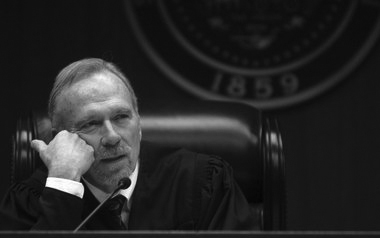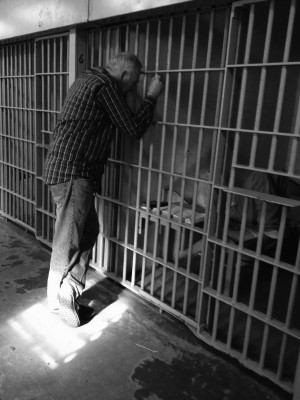“I was a judge you really didn’t want to appear in front of,” says Tom Kohl, presiding judge in Washington County, Oregon. “I was really harsh, especially toward drug addicts that were charged with crimes.”

Judge Kohl
An estimated 30,000 people abuse alcohol or illicit drugs in Washington County, and Tom felt little compassion when they appeared before him in court.
But Tom’s attitude changed when he learned that his own daughter, Megan, was abusing drugs. As he saw her sinking deeper into drug abuse, his sympathy for drug addicts grew, and he began a drug court in March 2005 to help people like her.
Drug court is an intensive treatment program for addicts who have been charged with crimes. It involves counseling, group therapy, employment, and a weekly meeting with a judge.
“Our mission in drug court is to save people’s lives, to break the cycle of addiction, and to restore family relationships,” says Tom.
Tom hoped that drug court would help his addicted daughter.
“[My wife and I] were praying that Megan would be brought into the system because she wasn’t being accountable to anyone,” says Tom. “People who are moms and dads of addicts can understand that prayer.”

Megan
The Kohls’ prayers were answered when authorities charged Megan with meth distribution in May 2006, but she would never have an opportunity to face justice.
On July 21, 2006, at the age of 21, Megan was murdered.
“It’s a parent’s worst nightmare,” says Tom. “When I received word from the police officer … there was so much sorrow, despair, hopelessness.”
‘I Turned to God’
In the midst of tragedy, Tom found hope in his relationship with God.
“You either turn to God or away from God in situations like that,” says Tom. “I turned to God.”
This decision to turn to God saved Tom from being unforgiving toward Robert, the man who murdered his daughter.
“Unforgiveness turns into bitterness and anger, and that can just ruin your life,” says Tom. “Unforgiveness is a prison. When you come to a point when you can forgive, you’re set free.”
During the trial, Tom came face to face with Robert.
“I had a chance to tell him in court that I had forgiven him before I even met him, which was only possible through the presence of Jesus Christ in my life,” says Tom.
On April 9, 2009, the jury sentenced Robert to life without parole.
A Father Becomes an Author
After the trial was finished, Tom felt compelled to write a book about his experience. Tom finished his book, “Losing Megan,” in November 2010; but he likes to say that he had one more chapter to write.
“God put it on my heart to visit the murderer of my daughter and talk with him,” says Tom.
“People asked me why I [was going] to visit him, and I said, ‘I don’t know, but God is preparing my heart.’”
During the prison visit, Tom spent an hour with Robert. Tom recalls that after 15 minutes, he had nothing left to say. That’s when he asked Robert if he had any questions in return.
“[Robert] said, ‘I’m so sorry, Judge. … how can you be so kind to me?’
At that point, I knew that Jesus had opened the door for me to talk about the Gospel,” says Tom.
Tom spent the rest of his visit telling Robert about his faith in God.
The finished book, published in 2012, has taken Tom to places he never expected to go.
“I thought I was writing the book for people who had suffered the loss of a child,” says Tom. “But the door opened for me to start going into prisons to speak about hope and forgiveness and Jesus Christ.”
The Story Spreads

Tom prays with a prisoner at Louisiana State Penitentiary.
Tom began sharing his story in prisons around the country, and is even traveling to Rwanda, a country in Africa, to speak in the prison system there.
Everywhere he goes, Tom meets someone who has been impacted by his story.
“Once at a luncheon I attended, I sat down next to a man I did not know. He asked me if I was Judge Kohl and cautiously told me that he used drugs with Megan. He told me that when she was murdered, it affected him so much that he stopped using drugs,” says Tom.
“Megan’s death gave this man life. Only God can do something like that.”
Ultimately, Tom hopes his story is an example of the freedom possible through forgiveness.
“There are a lot of people in prison who have that unforgiveness,” says Tom. “You have to ask God for the power to forgive. We all struggle with it … you need to get down on your knees every day and ask God to help.”